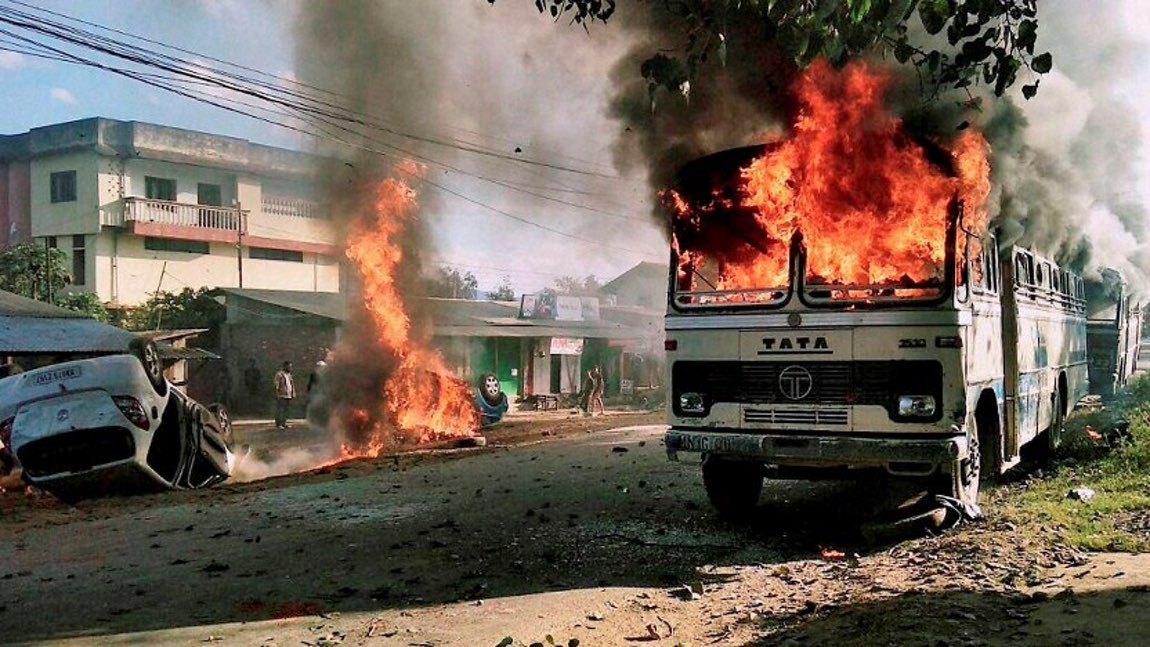
In blockade-hit Manipur, a disturbing question is doing the rounds. And even those who imposed the blockade the first time – the United Naga Council (UNC) – are posing this question.
“Is Chief Minister Okram Ibobi sustaining the economic blockade to serve his own interest?”
Since 1 November, the landlocked state has been cut off from the rest of the country, with its lifeline national highways – NH2 (between Nagaland and Manipur) and NH37 (between Assam and Manipur) – blocked by UNC activists protesting against the state government’s plan to create new districts by bifurcating what they call “ancestral Naga areas”.
Despite the intensity of the protests, the Ibobi government went ahead with its plan and created seven new districts. Many considered this a “surgical strike” to appease a major chunk of voters – particularly the Meitei and Kuki voters – in the Assembly election-bound state.
New States to Appease Voters?
The declaration of the new districts on 8 December was a big insult.
“Ibobi literally slapped us in the face, showing his intolerance towards the aspiration of the Nagas living in Manipur. The UNC totally rejects the district creation and demands the unconditional release of our president and publicity secretary immediately,” said UNC General Secretary Milan Shimray.
Shimray added that Indian government representatives, particularly from the Union Ministry of Home Affairs, have been engaging with them, making fervent appeals to lift the blockade.
“We feel the pain of the people who are reeling under the blockade. Instead of handling it politically, Ibobi chose to show his might and arrested our leaders. He then refused to talk with us. Even if the UNC wants to lift the blockade, its hands are tied. All we are asking is for him to sit at a table and thrash out our differences. But it seems Ibobi is showing no interest in resolving the impasse. Everyone knows what game he is playing and for what.”
Frustrations in the Valley Rise
With the blockade in place for over 50 days, the plight of the people, irrespective of their ethnic affiliation, has multiplied. Frustration of the people hit by scarcity of fuel and essential goods – both in the valley and hills – have begun to surface on the streets.
Convoys of loaded freight trucks and tanks, moving along the national highway under government-provided security cover, are routinely damaged by blockade supporters. Even truck drivers have sustained bullet injuries.

Initially activists on both sides ransacked essential goods like food grains, potatoes and pulses after pulling them down from vehicles. This outburst took an extreme form when the state government – instead of pacifying them – chose to show arrogance and tried to push its weight around. Over 22 vehicles – including buses carrying people to the district of Ukhrul – were halted and burnt down on 18 December on the Imphal-Ukhrul state highway.
Few days earlier, the oldest church of Manipur and a Meitei church were attacked. In the hills, trucks and government offices were burnt in Ukhrul and Tamenglong districts.
While the people of this multi-ethnic society state are on the brink of a communal clash and their struggle becoming unbearable, the Congress party in Manipur has regained lost grounds against the Bharatiya Janata Party (BJP) that was fast gaining popularity until the outbreak.
Creation of New Districts: The Game Changer
Definitely the creation of seven new districts was the game changer. Majority of the people – both in the hills and the valley – hailed the decision. This saw Ibobi’s popularity rise phenomenally. For most people of the newly created districts, the latest move of the government, despite its political motivation will translate to increased convenience in accessing government services. Even the UNC leadership knows this.
While the Congress and Ibobi, who is seen as a patriarch in the party’s fortune in Manipur, is gaining popularity both in the valley and in the hills, the BJP is in limbo. While imposition of President’s rule is definitely an option, however, given its experience with President’s rule in states ruled by the Congress, it seems the party is reluctant to act despite pleas from its state unit.
With options are running out with its arch rival making inroads at its expense, the directive by the Home Affairs Ministry to release the UNC leaders unconditionally became a trump card for Ibobi. To the delight of the voters, Ibobi responded, representing 40 seats out of 60 in the Legislative Assembly, saying the UNC leaders will be released only when the economic blockade is lifted and that too with the assurance that it will not resort to such a means in future. This ‘verdict’ was totally in sync with the valley and Kuki voters of Manipur and unfortunately, it may seem the only person or party who stands to gain is Ibobi or the Congress. But this is at the expense of the people who are at the brink of ethnic clashes.
It is high time that Ibobi Singh realises he has gained what is there to gain, and turn his focus now on addressing the public’s plight by resolving the impasse.
Source: The Quint



